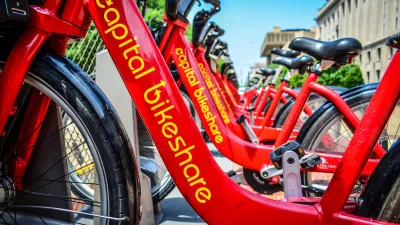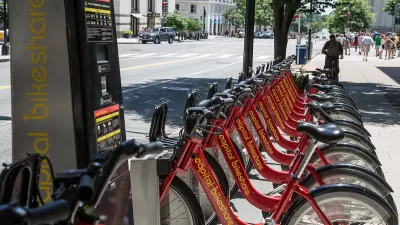Tom Vanderbilt discusses the development of D.C.'s Capital Bikeshare program - the nation’s largest, most successful bike-share service - which "was essentially born late one night, two decades ago, in a library."
For the inspiration for Capital Bikeshare, Vanderbilt gives credit to Paul DeMaio, who as an urban planning student at the University of Virginia wrote his master’s thesis on ByCyklen, a “city bike” program launched by the city of Copenhagen. Many years later, DeMaio's research and advocacy led to Smart Bike DC - the first commercial bike-sharing program in a major U.S. city. The lessons learned when implementing that foundering system led to a larger regional bike-share system under the guidance of Gabe Klein, "a former VP at car-sharing pioneer ZipCar and political neophyte," who had been appointed head of D.C.'s DOT.
Now the envy of such bike-friendly cities as Portland, Seattle, New York, and San Francisco, Capital Bikeshare can boast of their 1670+ bicycles at 175+ stations across Washington, D.C., Arlington, VA, and Alexandria, VA.
"That D.C has been a leader in American bike sharing is somewhat surprising," says Vanderbilt. "But D.C. has some inherent qualities that helped make this success possible: A relatively healthy number of cyclists (and an active cycling advocacy scene), a young (and getting younger) population, and a robust tourist market. D.C., notes Klein, is also unique in terms of being a city that is not part of an overseeing state, giving it a certain autonomy."
"But all this kindling needed the continued sparking of progressive planners and policymakers having conversations—at conferences, in offhand remarks at the end of meetings—about this ephemeral, European idea."
FULL STORY: The Best Bike-Sharing Program in the United States

Maui's Vacation Rental Debate Turns Ugly
Verbal attacks, misinformation campaigns and fistfights plague a high-stakes debate to convert thousands of vacation rentals into long-term housing.

Planetizen Federal Action Tracker
A weekly monitor of how Trump’s orders and actions are impacting planners and planning in America.

Chicago’s Ghost Rails
Just beneath the surface of the modern city lie the remnants of its expansive early 20th-century streetcar system.

Bend, Oregon Zoning Reforms Prioritize Small-Scale Housing
The city altered its zoning code to allow multi-family housing and eliminated parking mandates citywide.

Amtrak Cutting Jobs, Funding to High-Speed Rail
The agency plans to cut 10 percent of its workforce and has confirmed it will not fund new high-speed rail projects.

LA Denies Basic Services to Unhoused Residents
The city has repeatedly failed to respond to requests for trash pickup at encampment sites, and eliminated a program that provided mobile showers and toilets.
Urban Design for Planners 1: Software Tools
This six-course series explores essential urban design concepts using open source software and equips planners with the tools they need to participate fully in the urban design process.
Planning for Universal Design
Learn the tools for implementing Universal Design in planning regulations.
planning NEXT
Appalachian Highlands Housing Partners
Mpact (founded as Rail~Volution)
City of Camden Redevelopment Agency
City of Astoria
City of Portland
City of Laramie





























